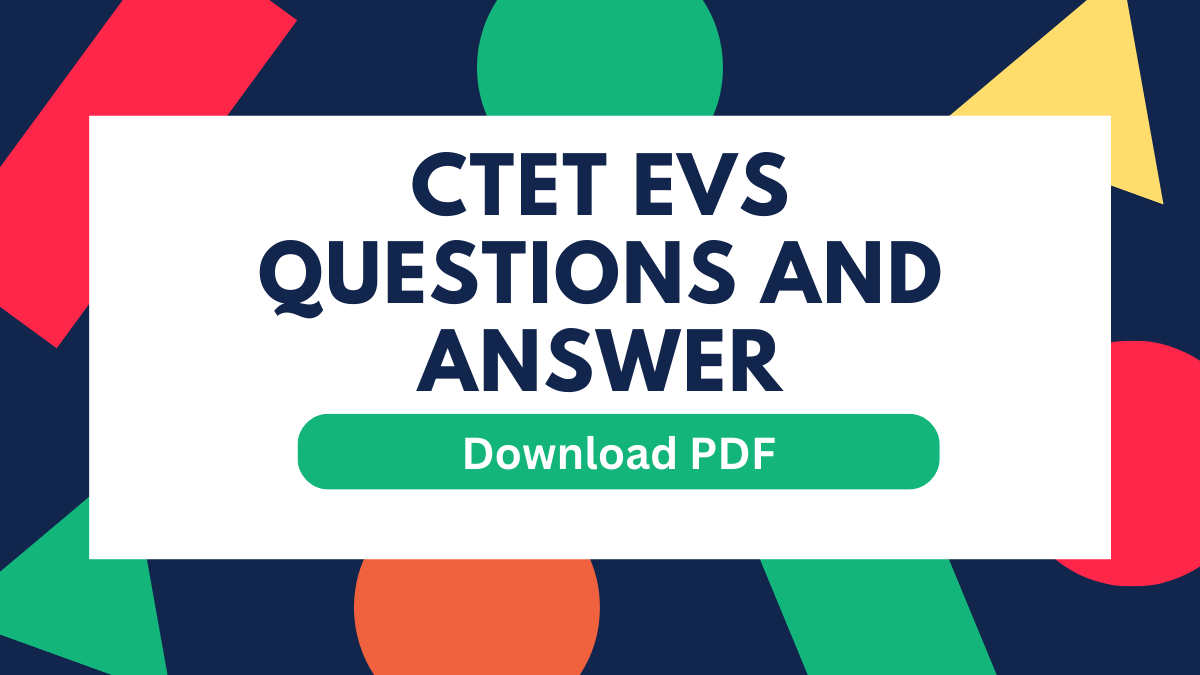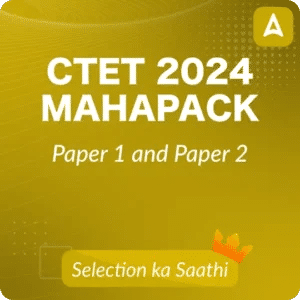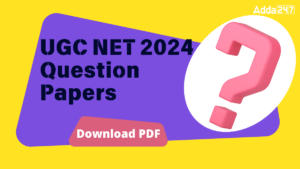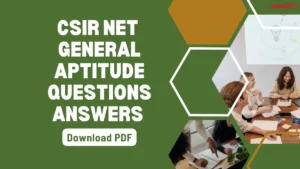Table of Contents
The Central Board of Secondary Education (CBSE) has confirmed that the CTET 2024 Exam will take place on 15th December 2024, with complete details available on the official website. As the exam approaches, candidates are intensifying their preparations, especially for the Environment Studies (EVS) section, which carries a substantial 30 marks in Paper 1.
This section covers key topics like environmental science and teaching strategies, requiring in-depth knowledge and preparation. Recognizing the significance of this portion, we are dedicated to supporting CTET aspirants by offering a collection of expertly designed CTET EVS Questions and Answers, aimed at sharpening their preparation and boosting their confidence for the exam.
CTET EVS Section: Overview
The CTET 2024 Exam, organized by CBSE, will be held in offline mode. Candidates aspiring to qualify as teachers in government schools across India are required to take the CTET Exam 2024 and for the preparation candidates need practice sets from platforms like Adda247 i.e. CTET EVS Questions and Answer. For further details regarding the Environment Studies (EVS) section, please refer to the table below.
| Environment Studies Section | ||
| Exam Name | CTET (Central Teacher Eligibility Test) | |
| Conducting Body | CBSE | |
| CTET Exam Mode | Offline | |
| CTET 2024 Exam Date | 15 December 2024 | |
| Environment Studies Paper | Paper 1 | |
| Total Questions | 30 questions | |
| Total Marks | 30 marks | |
| Total Time | 2.5 Hr | |
| Marking | For the right answer 1 mark | |
| Negative Marking | No | |
| Question Pattern | Objective type | |
| Language | Bilingual | |
| Difficulty level for Paper 1 | Upto 8th Class | |
| Examination pattern | based on the primary level for Paper I | |
| Examination Content |
|
|
Download Environment Studies Questions and Answers PDF
Here is the direct link to download the comprehensive CTET Environment Studies Question and Answer PDF. It is crucial for candidates to access this detailed PDF, which provides 50 CTET EVS questions along with answers, covering both content and pedagogy aspects to enhance their preparation.
Download CTET EVS Questions and Answers PDF
CTET EVS Questions
Q1. Fermentation is the conversion of
(a) Sugar into alcohol
(b) Yeast into alcohol
(c) Sugar into CO₂
(d) Yeast into CO₂
Q2. Your house is located at X and the bookshop is located at Y. Although the market is just opposite but you cannot go straight because of the busy highway having barriers in between. So, you first go 100 m due North, then cross a 50 m long Zebra Crossing which is due West and finally reach the bookshop at Y which is 150 m due South. With respect to the bookshop at Y, the direction of your house at X is
(a) North-East
(b) North-West
(c) South-East
(d) South-West
Q3. Freeplay is where children
(a) can do outdoor or indoor activities
(b) follow the rules of the play
(c) play gender-specific games as suggested by adults
(d) organise specific activities
Q4. Sprouting in seeds can take place in the absence of
(a) Sunlight
(b) Air
(c) Moisture
(d) Moderate temperature
Q5. A person boarded an express train on 5th September, 2022 at Bhiwandi Road Railway Station for Nagercoil. The train departed at 21:15 hours from Bhiwandi Road and reached Nagercoil at 04:45 hours on 7th September, 2022. If the distance covered by the train is 1877 kilometres, the average speed of the train is
(a) 60.5 km/h
(b) 59.5 km/h
(c) 59.9 km/h
(d) 59.0 km/h
Q6. Pasteurized milk is heated to about then suddenly chilled & stored.
(a) 100°C for 15 minutes
(b) 100°C for 3 minutes
(c) 70°C for 5 minutes
(d) 70°C for 15 to 30 seconds
Q7. Based on the physical characteristics, Pumpkin plant can be classified as a
(a) Climber
(b) Shrub
(c) Creeper
(d) Herb
Q8. Reading by touching and feeling with fingers is used by people who are unable to
(a) hear
(b) talk
(c) touch
(d) see
Q9. The process of cooling due to evaporation is slow when the area of the water surface in contact with the atmosphere
(a) increases and the atmospheric temperature is high.
(b) increases and the atmospheric temperature is low.
(c) decreases and the atmospheric temperature is high.
(d) decreases and the atmospheric temperature is low.
Q10. The lively dance form of Bundelkhand region is
(a) Swang
(b) Matki
(c) Bhagoria
(d) Lavani
Q11. In case of plants, identify the correct option.
- Plants prevent soil erosion.
- Dead and dried leaves are used to make fertilizers and pesticides.
- Animals provide shelter for plants.
- Plants provide us seeds some of which can be eaten.
(a) A and B
(b) B and C
(c) C and D
(d) A and D
Q12. Parts of plants and their roles are mentioned below. The most appropriate statement is
(a) Roots connect the plant to the leaves.
(b) Fruits help in pollination.
(c) Flowers are the reproductive parts of the plant.
(d) Leaves support the upper part of the plant.
Q13. Select from the following a pair of Union Territories of India:
(a) Mizoram and Lakshdweep
(b) Jharkhand and Chhattisgarh
(c) Ladakh and Puducherry
(d) Jammu and Kashmir and Nagaland
Q14. In a cultural festival, Shruti wore a traditional saree/dress of Maharashtra known as
(a) Banarasi
(b) Nauvari
(c) Kalamkari
(d) Jamdani
Q15. As per ‘The Prohibition of Child Marriage Act, 2006’ minimum age for marriage in India is
(a) 18 years for boys and 18 years for girls
(b) 18 years for girls and 21 years for boys
(c) 21 years for boys and 21 years for girls
CTET EVS Answer and Its Solutions
S1. Ans.(a)
Sol. The process of converting sugar into alcohol is called Fermentation. Fermentation is an anaerobic process where even though oxygen is not available, energy can be released from glucose. Fermentation occurs in yeast cells and bacteria and also in the muscles of animals. It is an anaerobic pathway in which glucose is broken down.
S2. Ans.(a)
Sol. Direction is divided into 8 sections, 4 cardinal directions, and 4 ordinal directions.
- The four cardinal directions are the directions north, east, south, and west, commonly denoted by their initials N, E, S, and W.
- East and west are perpendiculars to north and south.
- East is in the clockwise direction of rotation from north and west is directly opposite east.
- The ordinal directions are northeast (NE), southeast (SE), southwest (SW), and northwest (NW).
- NE, SE, SW, and NW lie in between the cardinal directions north and east, south and east, south and west, and north and west respectively.
S3. Ans.(a)
Sol. Free play allows children to explore their environment, exercise their creativity, and make their own decisions about how to play and interact with others.
S4. Ans.(a)
Sol. Sprouting in seeds can occur in the absence of sunlight, as the process of sprouting primarily relies on the internal reserves of the seed rather than photosynthesis.
S5. Ans.(b)
Sol. Distance covered = 1877 km
Total time taken = 5th Sep 21:15 hours to 7th Sep 04:45 hours = 31.5 hrs
Average Speed = 1877/31.5 km/h = 59.5 km/h
S6. Ans.(d)
Sol. Pasteurised milk can be consumed without boiling as it is free from harmful microbes. The milk is heated to about 700C for 15 to 30 seconds and then suddenly chilled and stored. By doing so, it prevents the growth of microbes. This process was discovered by Louis Pasteur. It is called pasteurisation.
S7. Ans.(c)
Sol. Based on the physical characteristics, Pumpkin plant can be classified as a Creeper. Creepers are planting that creep across the earth, as their name suggests. Plants with weak stems that cannot stand upright but spread on the ground are called creepers. Watermelon, strawberries, pumpkin, and sweet potatoes are some examples.
S8. Ans.(d)
Sol. Braille, reading by touching is a way for blind people to read. Braille, a universally accepted system of writing used by and for blind persons and consisting of a code of 63 characters. Each character made up of one to six raised dots arranged in a six-position matrix or cell.
S9. Ans.(d)
Sol. The process of cooling due to evaporation is fast when the area of water surface in contact with the atmosphere increases. The atmospheric temperature becomes high and the humidity (water vapour) in the air is low.
S10. Ans.(a)
Sol. The lively dance from of Bundelkhand region is Swang. In the Bundelkhand region of India, this dance is popular mainly in the state of Haryana, also in Rajasthan, Uttar Pradesh and the Malwa region of Madhya Pradesh. The Swang is a type of musical drama, in which folktales are dramatized with folk songs, music and dance etc.
S11. Ans.(d)
Sol. Plants serve various important roles in the ecosystem and interact with their surroundings in multiple ways. Plants play a crucial role in preventing soil erosion. The root systems of plants help hod the soil in place, reducing the risk of erosion caused by wind or water. By anchoring themselves in the ground, plants bind the soil particles together, making it less susceptible to being washed away. Furthermore, plants provide us with seeds, many of which are edible and serve as a valuable food source. They contain the necessary nutrients and genetic material for the growth of new plants.
S12. Ans.(c)
Sol. The correct answer is flowers are the reproductive parts of the plant.
As a plant’s reproductive part, a flower contains a stamen (male flower part) or pistil (female flower part).
The pistil is the female reproductive unit of plants.
A pistil has the following three major parts:
- Stigma: The stigma is at the top and is connected to the ovary by the style. It receives the pollen grains.
- Style: It is an elongated slender part beneath the stigma, that connects the stigma with the ovary.
- Ovary: It is the basal swollen part of the pistil.
The stamen is the male reproductive unit of plants and consists of the following two parts:-
- Filament: A long and slender stalk called filament which may be joined or free.
- Anther: A bilobed terminal structure called the anther.
All of these parts help in plant reproduction and ultimately result in the growth of a new plant.
S13. Ans.(c)
Sol. There are currently 28 states and 8 union territories in India.
Union Territories in India are:-
- National Capital Territory of Delhi
- Andaman and Nicobar Islands
- Dadra and Nagar Haveli and Daman and Diu
- Chandigarh
- Lakshadweep
- Ladakh
- Puducherry
- Jammu and Kashmir
S14. Ans.(b)
Sol. The correct answer is (b).
Nauvari – A single nine-yard sari also known as Kasta saree.
S15. Ans.(b)
Sol. As per ‘The Prohibition of Child Marriage Act, 2006’ the minimum age for marriage in India is 18 years for boys and 18 years for girls.




 CSIR NET Chemical Science Questions with...
CSIR NET Chemical Science Questions with...
 UGC NET 2024-25 Question Papers 1 and 2,...
UGC NET 2024-25 Question Papers 1 and 2,...
 CSIR NET General Aptitude Questions Answ...
CSIR NET General Aptitude Questions Answ...














